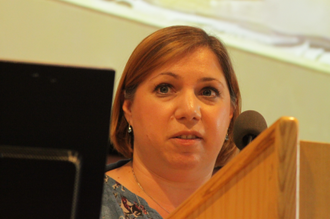NJPN Conference: Overturn a "deliberately cruel asylum system"

Sarah Teather
Sarah Teather, the Director of the Jesuit Refugee Service, has urged people of good will to come together in order to overturn the government's "deeply and profoundly flawed asylum process and hostile environment agenda".
Speaking at the annual gathering of the National Justice and Peace Network of England and Wales (NJPN) last Saturday, Ms Teather, a former Liberal Democrat MP and junior minister, said that in the wake of the Windrush Scandal there was a "kind of window" for action. "For the first time in five years, the Home Office is in retreat from its aggressive practices" she said. Ms Teather warned that in reality, however, the freshly named Compliance Agenda "was the same stuff", adding that, "the Government is doing its best to close down scrutiny".
Only last week, Cardinal Vincent Nichols described the Government's treatment of asylum seekers as 'a shame on our country' after a visit to a JRS centre, and Ms Teather asserted that refugees and asylum seekers, the most marginalised in our society, were the true subjects of the hostile environment agenda.
Of the 65 million refugees around the world, most are found in the poorest and struggling countries, whereas the United Kingdom receives just 30,000 a year, she said. Asylum seekers were dispersed around the country in poor housing and given little to live on; access to legal aid had been reduced and yet the assessment process itself was fundamentally undermined by a "hermeneutic of suspicion", Ms Teather noted. "That 40 per cent get a refusal of asylum overturned on appeal gives you some sense how bad it is."
She proceeded to describe the "web of problems" which trapped those asylum seekers whose applications had been refused. These included the "extraordinary" fact of a Conservative Party criminalising those seeking work and oppressing asylum seekers with destitution, and the constant threat of detention, and the impact this had on mental health.
Of those attending the JRS day centre, she said, "62 per cent had been street homeless in the previous twelve months", while "34 per cent who had found somewhere to stay were frightened of the person or persons they lived with". Here, Ms Teather asked her audience to think why that might be. "This is cruelty meted out in a deliberate way; this is government policy: It is done to make people give up their claims; It is a deliberate attempt to stop people from thinking they are safe," she said.
It was the JRS's mission to provide a counter-culture, to provide hospitality, community and friendship for the demonised, asserted Ms Teather. She applauded her "extraordinary co-workers", particularly women religious who provided shelter and community. At the same time, she noted that it was the asylum seekers themselves who had afforded grace to the sisters at a moment when their own religious orders were winding down. Here was a new calling: to share their community life with those who often came from a different culture or a different faith. The effect on both parties was "completely remarkable".
Ms Teather spoke movingly on coming to recognise a "primal human urge: that of giving to others". She described how the asylum seekers themselves were energised by being able to use their manifold talents at the centre, cooking for guests and each other; sharing their knowledge and practical skills.
Referring to the conference theme, 'In the Shelter of Each Other, the People Live', Ms Teather noted that being drawn into this shadowy shelter through working alongside the marginalised asylum seekers was profoundly transforming and eye-opening. "Here is an encounter with what is true."
She concluded with two resonant quotations, from Psalm 34: 'The Lord hears the cry of the poor: blessed be the name of the Lord,' and from Pope Francis's exhortation Gaudete et Exsultate: 'The face of God is reflected in the faces of our brothers and sisters.'
Later that evening, The Claim - a new Spanish language film about Blessed Archbishop Oscar Romero of El Salvador - made the point that Romero was the first martyr of Vatican II's preferential option for the poor. He is to be canonised this October and is a patron of the National Justice and Peace Network.
Dr Philip Crispin is a Lecturer in Drama at the University of Hull.


















